Dunlop, Mackie & Co.
Wine, Spirit, Ale & Porter Merchants
- Date:
- c.1846-October 1846: Matthew Dunlop, King Street, Queen Square.
- c.October 1846-1881: Dunlop Mackie & Co., 34 Broad Quay,
(opposite the drawbridge) Bristol.
- c.1881-1926: Dunlop Buildings, New Baldwin Street.
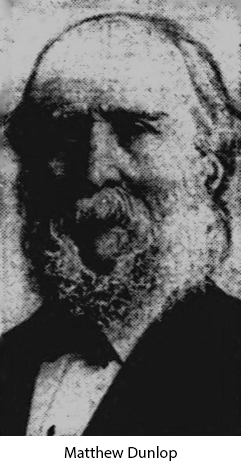 Matthew Dunlop
Matthew Dunlop was born in Scotland on
27 July 1813 baptised at Mearns, Renfrewshire on 15 Aug. 1813, son of John
Dunlop and Agnes Young. He was already a wine merchant in King Street,
Queen Square, Bristol when he married Margaret, eldest daughter of William
Cunningham of Dublin, at the Trinitarian Presbyterian Union Chapel, Lower
Abbey-street, Dublin, Ireland by the Rev. S. G. Morrison, on 28 October
1846. The couple came back to Bristol where Matthew had recently
established his business. By 1851 he was living at Glo'ster Cottage, 14
Wellington Place, St. Barnabus, Stokes Croft, Bristol, with daughter Ann
age 3 and Agnes age 1. He was a Wine, Spirit and Porter merchant at this
date. His wife Margaret had died 12 August 1850, age 29. On 12 Feb. 1852
Matthew married again to Jane, only daughter of Mr. Samuel Frost of
Cumberland Terrace, at Hope Chapel, Clifton by the Rev. J. T. Beighton.
From the Bristol Mercury - Saturday
3 October 1846 page 5: "DUNLOP, MACKIE, & CO., WINE, SPIRIT AND
PORTER MERCHANTS, 34 BROAD QUAY, (opposite drawbridge) Respectfully
announce to the Inhabitants of Bristol, Clifton, and Vicinities that they
have opened the above Central Premises for the Sale of WINES,SPIRITS,
PORTER, ALES, &c. In Making this announcement, they take leave to
state that their Business will be conducted precisely upon the same
principles as those which have so highly distinguished their other
Establishments in Liverpool, Manchester, Birmingham...(List of
available goods)...PORTER, &c., in Hogsheads, Barrels, and
Half-barrels. Small Quantities of any of the above will be sent to suit
Families, Terms, CASH—Bottles, Jars, &c., must be given in exchange,
or paid for on delivery of Goods: the amount charged will be repaid when
they are returned."
Ivie Mackie was born on 21 March
1805, baptised 28 March in Dailly, Ayrshire, Scotland, son of James Mackie
and Janet Anderson. He married Agnes Gladstone on 19 Aug. 1839 at Kelton,
Kirkcudbrightshire, Scotland. From Gore's Liverpool General Advertiser -
Thursday 29 August 1839: "On Monday, the 19th Aug. at Castle Douglas, Mr.
Mackie, of the firm of Mackie and Gladstone, spirit merchants,
Dublin, to Agnes, second daughter of the late John Gladstone, millwright,
Castle Douglas." He remained a partner in Mackie & Gladstone until his
death in 1873, and formed a new partnership with Matthew Dunlop late in
1846. In 1847 Ivie Mackie, was a wine
merchant, living at Arlington House, Oxford Road, Manchester. He was a
partner in the firm of Findlater and Mackie of 5 Ducie Place,
Exchange, Manchester which opened its doors on Monday 6 June 1842. This
company was a precursor of several modern companies. Ivie was Mayor of
Manchester 1857-1860.
Advertisement from J. Wright & Co.'s
Matthews Bristol Directory 1880. 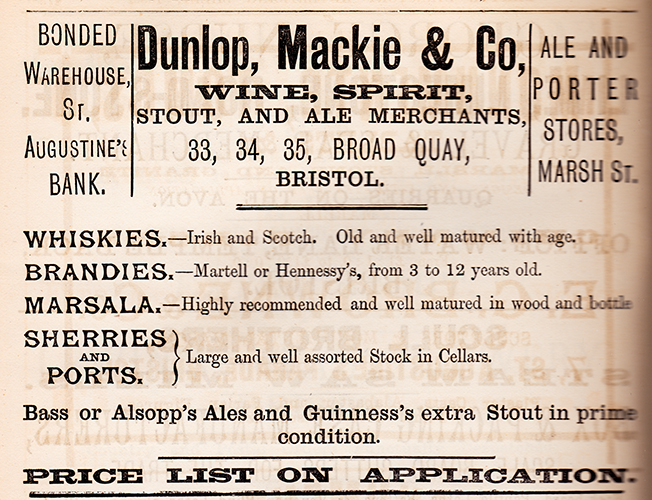
From The Gazette 10 Nov. 1863:
NOTICE is hereby given, that the Partnership carried on by the
undersigned, as Wine and Spirit Merchants, at Liverpool, under the firm
of Mackie and Gladstone, is terminated by mutual consent, so far as
regards the undersigned Edmund Gladstone, on the 30th June
last.—Liverpool, 24th July, 1863. Ivie Mackie,
Robert Gladstone, Edmund Gladstone.
From the Glasgow Herald -
Monday 12 October 1857 page 5: Deaths:—At Tenby, South Wales, on the 8th
instant, aged 34 years, Mr. James Dunlop, wine and spirit merchant,
Bristol, eldest son of Mr. James Dunlop, wine and spirit merchant, 28
Dunlop Street, Glasgow.James's mother Margaret Shirra died the same year
on 26 Oct. age 70. His father's business was under sequestration bu 6 Oct.
1859. Whether this James Dunlop is any relation to Matthew is uncertain.
In 1860 Matthew Dunlop was living at St.
Michael's Hill House when he was nominated for election to the ward of St.
James.
From The Gazette, 9 Dec. 1862:
"NOTICE is hereby given, that the Partnership heretofore subsisting
between us the undersigned, Matthew Dunlop and Ivie Mackie, under the
style or firm of Dunlop, Mackie, and Company, at the city of Bristol, as
Wine, Spirit, Ale, and Porter Merchants, was dissolved on the 1st day of
October last, by mutual consent.—As witness our hands this 3rd day of
December, 1862; Matthew Dunlop, Ivie Mackie." Ivie Mackie
retired from the business, but the company carried on under the same name.
Matthew Dunlop had tremendous respect for the man, naming his son, born
six years prior to this event, Ivie Mackie Dunlop, after him.
Ivie Mackie died on 23 February 1873.
From The Gazette, 8 June 1888:
NOTICE is hereby given, that the Partnership heretofore subsisting between
us the undersigned, Robert Gladstone and John Lambie, carrying on business
as Wine and Spirit Merchants, at 86 and 88, Hamilton-street, Birkenhead,
in the county of Chester, under the style or firm of Mackie
and Gladstone, has been dissolved, by mutual consent, as and from the 2nd
day of June, 1888. All debts due to and owing by the said late firm will
be received and paid by the said Robert Gladstone, who will continue
to carry on the said business under the style or firm of Mackie and
Gladstone, at the above address.—Dated this 6th day of June,
1888. Robert Gladstone. John Lambie.
From The Gazette, 23 Jan. 1891:
NOTICE is hereby given, that the Partnership heretofore subsisting between
the undersigned, Matthew Dunlop and Crawford Fulton, at Wind-street and
College-street, Swansea, in the county of Glamorgan, as Wine, Spirit, Ale,
Beer, and Porter Merchants, under the style or firm of Fulton, Dunlop, and
Company, was dissolved, by mutual consent, on the 1st day of
December last, the said Matthew Dunlop retiring therefrom, The business
will continue to be carried on by the said Crawford Fulton, who will
receive and pay all debts due to and by the late firm.—Dated the
21st day of
January,'1891.
, MATTHEW DUNLOP: CRAWFORD FULTON.
From Ports of the Bristol Channel
1893—"Fulton, Dunlop & Co., Wine, Spirit, Ale, and Porter
Merchants, 16, Duke Street, Cardiff. In connection with the
wine and. spirit trade at Cardiff a position of distinction is held, by
the old and well-known firm of Messrs. Fulton, Dunlop & Co., whose
business dates from the year 1859. This eminent house has its headquarters
in premises which were specially built to meet the requirements of its
extensive trade. The establishment in Duke Street comprises spacious
offices, sale-room, stores, and cellars; and in addition to this the firm
have bonded warehouses in Westgate Street, and other large cellars in
Working Street, Queen Street, and Church Street, together with stabling
for a number of horses used in the delivery of goods. There are also
highly successful retail depots in Working Street and St. John Street.
Messrs. Fulton, Dunlop & Co. hold stocks of wines and spirits which
are among the largest, best, and most comprehensive in the Principality.
Their wine-list embraces the choicest growths and vintages of champagne,
sparkling moselle, claret, still and sparkling hock, still and sparkling
burgundy, sherry, madeira, marsala, port from the wood, and old crusted
port of rare quality. All these wine's are of the finest character in
their several classes, and are the very best that capital, enterprise, and
a masterly knowledge of the trade can secure. No finer goods can be
obtained anywhere, and this policy of maintaining the highest possible
standard of merit in their wines has long distinguished the firm under
notice, and won for them a high, place in the esteem and confidence of
connoisseurs and the best classes of the public.
The same principle is carried out in the matter of spirits, and Messrs.
Fulton, Dunlop & Co. stock large quantities of the choicest brandies,
Irish and Scotch whiskies, rum, gin, hollands, and all the reputed brands
of foreign and British liqueurs and cordials. Finally, it may be noted
that this firm do an immense trade in bottled beer and stout, and among
their specialities in this department are Guinness’s Dublin extra stout,
Bass’s and Allsopp’s pale ales, Findlater’s invalid stout, London extra
stout, and fine Scotch ale. They also supply the leading beers and stouts
in cask, and have an extensive trade in aerated waters, including those of
Schweppe, Hooper, Ross, Cantrell & Cochrane, the Apollinaris Company,
&c.
Everything sent out by this firm is in first-rate condition, this being
ensured by laying down large stocks and holding them for long periods. The
entire business is conducted upon high-class lines, and Messrs. Fulton,
Dunlop & Co. have always catered specially to the requirements of that
section of society in which their wide and valuable connection is mainly
developed. The house enjoys the patronage of the first families of the
district, and holds the rank of a recognised leader in its important
trade. There is a branch at Windsor Road, Penarth, and goods of the same
description as those supplied by the firm at Cardiff and Penarth (and at
the same prices) may be had of Messrs. Fulton & Co., Swansea; Dunlop,
Mackie & Co., Bristol; Mackie & Gladstone, Birkenhead, Liverpool,
and Birmingham; and Findlater, Mackie & Co., London, Dublin, Brighton,
and Manchester. The Cardiff business is under the sole management of Mr.
Alderman Andrew Fulton, who founded it, and to whose remarkably extensive
experience and active energy the concern owes much of its success and
development. Alderman Fulton stands among the most prominent and most
respected citizens of Cardiff, and is one of the oldest members of the
Town Council, having been elected thereto in 1875. He was Mayor of Cardiff
in 1884-85, and was made an alderman of the borough in 1887, which
important office he continues to fill with close attention to the social
and municipal interests of the community.
We may add that telegrams for Messrs. Fulton, Dunlop & Co. should be
addressed “Fulton, Cardiff.”
From the Western Daily Press -
Wednesday 25 February 1863 : Cardiff: Messrs Fulton and Dunlop, wine
merchants, ware charged with obstructing the way of St. John Street, by
leaving casks in the carriage-way. As the summons was wrongly worded the
case was discharged, Mr Fulton promising to attend to the matter.
From the Bristol Mercury - Tuesday
14 October 1879, page 8: "BRISTOL MUSICAL FESTIVAL - DUNLOP, MACKIE, &
CO., 34, BROAD QUAY. Beg to inform Visitors to the Festival that they
intend OPENING A RESTAURANT, OPPOSITE THE COLSTON HALL, FOR THE SUPPLY OF
REFRESHMENTS DURING THE FESTIVAL WEEK. Conducted by Me F. CALDER,
confectioner, 30 Stoke's Croft."
In January 1881 the company's new premises "Dunlop
Buildings" were completed, in the French Renaissance style, in New
Baldwin Street "Catching the eye as something new-challenging admiration
as something handsome and imposing in the way of street architecture—and
commanding attention, dominating as it does the entrance to what has been
so long looked forward to as a " street of the future, and now virtually
existing as New Baldwin-street, is the massive structure which for the
past twelve months has been running a race for completion with the new
street itself, and beaten it with something in hand, " Dunlop's
Buildings," erected by Messrs. Dunlop, Mackie, and Co., the well.known
wine and spirit merchants of this city, and Gloucester, Cardiff, and
elsewhere, Messrs. Dunlop have large buildings in several other towns, but
nowhere do those establishments approach in dimensions or imposing.
appearance the really handsome and substantial structure just completed
from the designs of Mr. J. Bevan, of Nicholas-street, a local architect
whose name is deservedly well known in this city..." ( Bristol Mercury
- Wednesday 19 January 1881 page 2). This building also incorporated a
restaurant. The image below is by the builder, dated 16 April 1881.
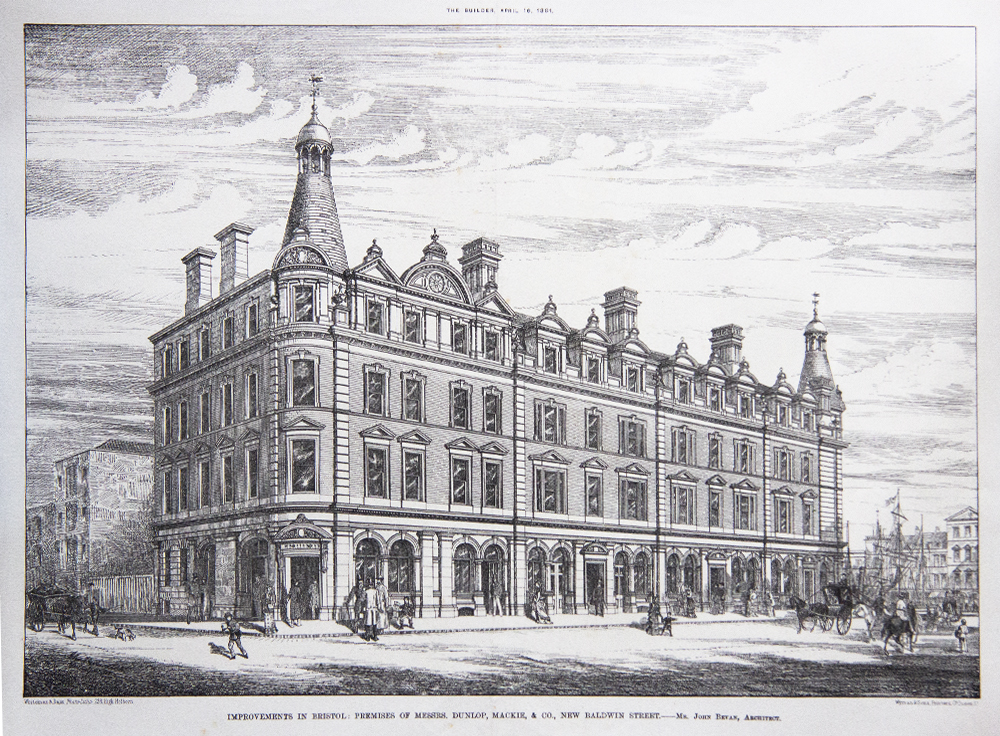
In April 1906, Dunlop, Mackie & Company had opened a branch in
Waterloo Street in Weston-Super-Mare.
Matthew Dunlop died 2 November 1899. His son Ivie Mackie Dunlop,
who was born in 1857 and married Emma Prothero Nott in Bristol in 1880,
continued in the companies for many years...
From the Western Mail - Wednesday 2 December
1959, page 8: "THE SCOTSMEN FROM IRELAND FOUND RICHES:— A HUNDRED
years ago Bacchus, the God of Wine, smiled benevolently over two wine
merchants who came to Cardiff to set up a new business. Today he is still
smiling on the firm, which is celebrating its centenary this year. Andrew
Fulton and Matthew Dunlop were Scotsmen, but had come to Cardiff from the
West Country. It was in Bristol that Andrew and his brother Crawford
learnt the wine merchant business. Matthew Dunlop had been one of several
Caledonians who, in the early 1830's had set out from their native land to
make their fortune in Ireland.
The famous wine merchant of the day, Alexander Findlater, of
Dublin. taught him the ABC of the wine trade. Later, Dunlop helped to
establish a wine merchant's company in Bristol, where he met his future
partner, Andrew Fulton. Why did they come to Cardiff? Because they had
heard stories of the industrial revolution that was taking place in South
Wales. A growing town, Cardiff was on the march. There was talk of "a coal
rush." As the vision of El Dorado in the mining valleys and of growing
employment in the docks spread, a stream of immigrants from Ireland and
the West Country flooded into South Wales. It was a bleak December day in
1859 when Fulton and Dunlop came from Bristol and opened shop on the
corner of St. John's Street and Duke Street. With the shrewdness of the
Scots, they opened just before Christmas. They had two departments, a
retail in St. John's Square and a wine and wholesale store around the
corner.
And the takings? In the first three days up to Christmas Eve the takings
of the two departments entered in neat copper-plate writing in the
accounts book, were £14 5s. 0d. and £13 5s. 6d. In those days a half pint
of whiskey, which was first traded in from Ireland, cost only 1s. 3d. You
could obtain a dozen pints of beer for 3s. 6d. and a bottle of good port
for 2s. 6d. a bottle and even less. In 1859 Cardiff was a cobble-stoned
town of about 30.000 people. Sixty years before it had been a mere cluster
of 320 houses. with a thousand people. Those early days had seen droves of
pack mules descending from the hillsides, bringing coal and iron from
Merthyr to small sailing ships on the Old Quay off St. Mary Street.
This primitive transport was superceded by the Glamorganshire Canal and,
in 1841, by the railway which fed the ships in the West Dock with coal
from the valleys. Sailing ships were giving way to steam, pack mules to
trains. Cardiff was growing rapidly. And while Cardiff was growing from a
small trading port to become the administrative centre of Wales, the small
firm of Fulton, Dunlop and Co. Ltd. also developed. The St. Johns Square
and Duke Street enterprises soon prospered with the town, and, in 1864
another firm was opened at Swansea by Andrew Fulton's younger brother
Crawford. At first Dunlop had a share in the new enterprise, but he was
later bought out, and the firm became Fulton and Company.
Near the shop at Duke Street the face of the town was changing. The first
Town Hall in High Street, little more than a stone's throw away, was being
demolished. A growing flow of traffic wanted more room than the narrow
streets offered, and the Town Hall was rebuilt on the site of the present
C.W.S. premises in St. Mary Street, which, in turn, gave way to the City
Hall, in Cathay's Park. The wine trade was being kept busy, too. With the
growth of the town the customers were moving farther and farther away. In
order not to lose all the trade that had been built up an "off-license"
shop was opened at Penarth in 1879. Trade in bottled beer was one of the
company's important features. When the firm was first established all
wines, spirits, beer and stout were bottled on the premises. Today brewers
bottle their own beer, and wines and spirits are all bottled before they
are bought by the wine merchants.
But the firm still does some bottling, especially of whiskey. The whiskey
is bought from the distillers, matured in the company's cellars, blended,
bottled and sold. In the 1870s the firm was maintaining a leading position
in the town, and the horse-drawn Fulton and Dunlop carts—now replaced by a
fleet of lorries and vans—were a familiar sight in Cardiff and the
surrounding district. Many of Andrew Fulton's associates in those days
were men whose names ring of Cardiff's early history like Mayors John and
Robert Bird, and William Alexander, who was Mayor in the year that the
firm was founded.
Inevitably, Andrew was soon drawn to take his part in the civic life of
his adopted town. It was to prove the start of a public service which not
only brought honour to himself, but also to Cardiff. He entered public
life in the gay days of marching progress in 1875. Andrew Fulton had the
reputation of being a wise and farseeing administrator, and within nine
years had become alderman and Mayor, and proudly won the gold chain of
office that was presented to the town in 1868 to commemorate the coming of
age of the third Marquess of Bute. The high regard in which ex-Mayor
Fulton was held led in 1886 to his election as the first freeman of the
town. The script on which the freedom was inscribed was enclosed in "a
magnificent casket." At the same time a gold and silver brooch was
presented to the ex- Mayoress, Mrs. Annie Fulton, described at the time as
"a lady of great charm who was noted for her charitableness."
Soon. such historic names as Lord Pontypridd who had been Mayor in
1880-81. Mr. Gladstone, the Duke of Clarence, Lord Roberts and Sir Henry
Stanley would be added to the freemen's roll. A landmark in the firm's
history came in 1889, when the partnership of Matthew Dunlop and Andrew
Fulton was turned into a private limited company. This step was made
partly because Matthew retired from the business and Andrew's health was
failing. The link with Dunlop Mackie, of Bristol, however, remained strong
until its take-over by the Bristol United Breweries. Ivie Mackie Dunlop,
the son of Matthew, became the first chairman of the company and held that
position until his death in 1934. He was highly esteemed in Bristol and
was High Sheriff of the City and County in 1918. The co-founder of the
firm, Andrew Fulton died in 1901 at the age of 70, and his wife died six
years later at 87.
They had developed a great love for the town and City of their adoption
and passed on leaving instructions for the establishment of the Fulton
Bequest. After Mrs Fulton's death the board was joined by Mr. G. W.
Fenwick, a nephew of her husband, and by William, the son of Crawford
Fulton, of Swansea, and who became chairman on the death of Ivie Mackie
Dunlop. During their lifetime they had been generous in their gifts to
several hospitals and other institutions of mercy. In 1882 when Andrew
Fulton was deeply immersed in civic affairs, a young boy from Troedyrhiw,
near Merthyr, joined the firm as a junior clerk. He was David Thomas
Evans, who was destined to rise to the chairmanship after many years as
managing director. In these days when "take-overs" are such a feature of
commercial life, Fulton, Dunlop & Co., are proud that they have always
retained family connections and the loyalty of their employees.
They say that it has helped to create that "personal touch" which has been
the hall-mark of the firm during its 100 years' existence. The present
chairman is a nephew of William and grandson of Crawford Fulton, the
pioneer of the Swansea firm, and a great-nephew of the co-founder Andrew
Fulton. In this centenary year the company is paying tribute to the long
records of many of the servants of the firm who grew up with it and
rejoiced in its success. They include Mr. Samuel Thorne, a former
departmental manager, and Mr. T. R. Williams, who still presides over the
wine cellars—both of whom have claimed more than half a century's
connection.
A similar record is held by a director, Mr. C. A. S. Hawkins, while Mr. J.
H. Bucknell, a director of the Swansea company, who joined the board in
1942, is still with the company. Other present directors are Mr. H. Broad
Davies and Mr. R. B. Hayes. The skill of the founders in blending has been
handed down through the years. One brand of whisky is matured in the
cellars for 12 years before it is released to the consumers. The bonded
warehouse in Westgate Street remains one of the company's strong features,
and enables the maturing of wines and spirits to be undertaken under ideal
conditions. Much of the success of the firm is due to the work done in the
wine cellars."
In 1926, Dunlop, Mackie & Co. was purchased by Bristol United Breweries who in turn were
subsequently purchased by Bristol Brewery Georges & Co. Ltd. In 1956..
| 4 Gallon Stoneware Tap Jar |
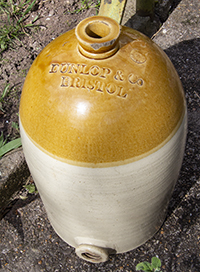 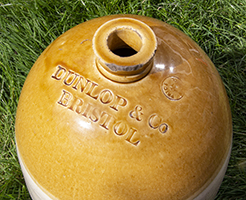 |
Impressed:
DUNLOP & Co / BRISTOL
Made without handle, likely originally had wicker basket.
Internally threaded tap aperture at base.
Potter: Price + Bristol.
|
| Half Pint Beer Bottle |
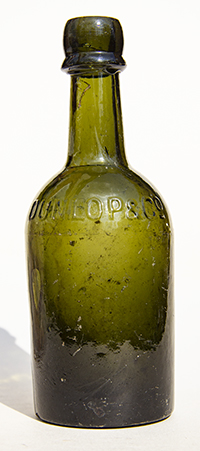 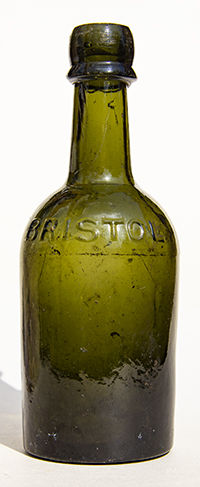 |
Embossed:
(Around shoulder DUNLOP & Co / BRISTOL
Glassworks: P. & R. / B (Powell & Ricketts /
Bristol.) Dark Green Glass, Cork Closure.
|
Return to Town Index
 Matthew Dunlop was born in Scotland on
27 July 1813 baptised at Mearns, Renfrewshire on 15 Aug. 1813, son of John
Dunlop and Agnes Young. He was already a wine merchant in King Street,
Queen Square, Bristol when he married Margaret, eldest daughter of William
Cunningham of Dublin, at the Trinitarian Presbyterian Union Chapel, Lower
Abbey-street, Dublin, Ireland by the Rev. S. G. Morrison, on 28 October
1846. The couple came back to Bristol where Matthew had recently
established his business. By 1851 he was living at Glo'ster Cottage, 14
Wellington Place, St. Barnabus, Stokes Croft, Bristol, with daughter Ann
age 3 and Agnes age 1. He was a Wine, Spirit and Porter merchant at this
date. His wife Margaret had died 12 August 1850, age 29. On 12 Feb. 1852
Matthew married again to Jane, only daughter of Mr. Samuel Frost of
Cumberland Terrace, at Hope Chapel, Clifton by the Rev. J. T. Beighton.
Matthew Dunlop was born in Scotland on
27 July 1813 baptised at Mearns, Renfrewshire on 15 Aug. 1813, son of John
Dunlop and Agnes Young. He was already a wine merchant in King Street,
Queen Square, Bristol when he married Margaret, eldest daughter of William
Cunningham of Dublin, at the Trinitarian Presbyterian Union Chapel, Lower
Abbey-street, Dublin, Ireland by the Rev. S. G. Morrison, on 28 October
1846. The couple came back to Bristol where Matthew had recently
established his business. By 1851 he was living at Glo'ster Cottage, 14
Wellington Place, St. Barnabus, Stokes Croft, Bristol, with daughter Ann
age 3 and Agnes age 1. He was a Wine, Spirit and Porter merchant at this
date. His wife Margaret had died 12 August 1850, age 29. On 12 Feb. 1852
Matthew married again to Jane, only daughter of Mr. Samuel Frost of
Cumberland Terrace, at Hope Chapel, Clifton by the Rev. J. T. Beighton. 




